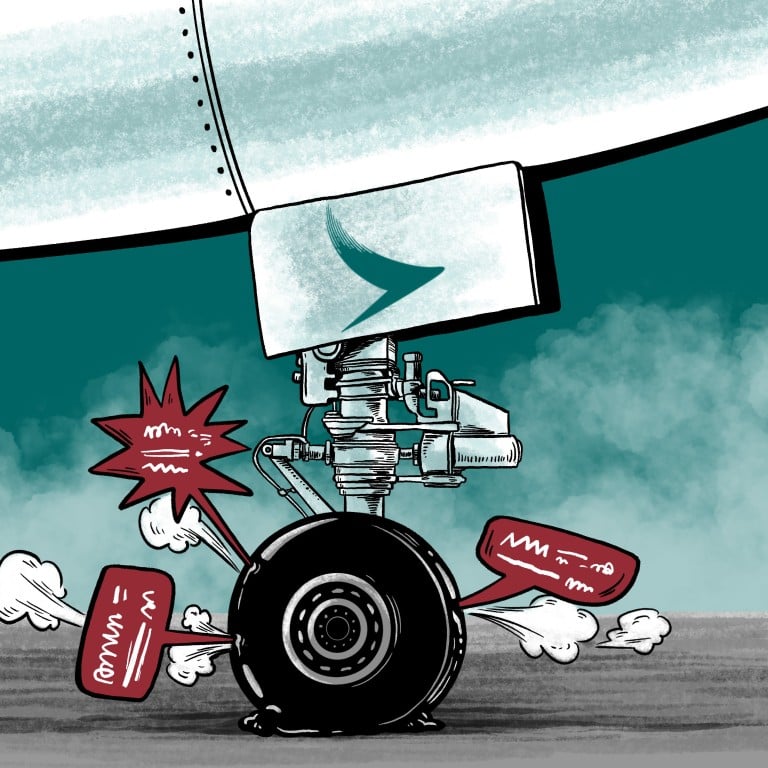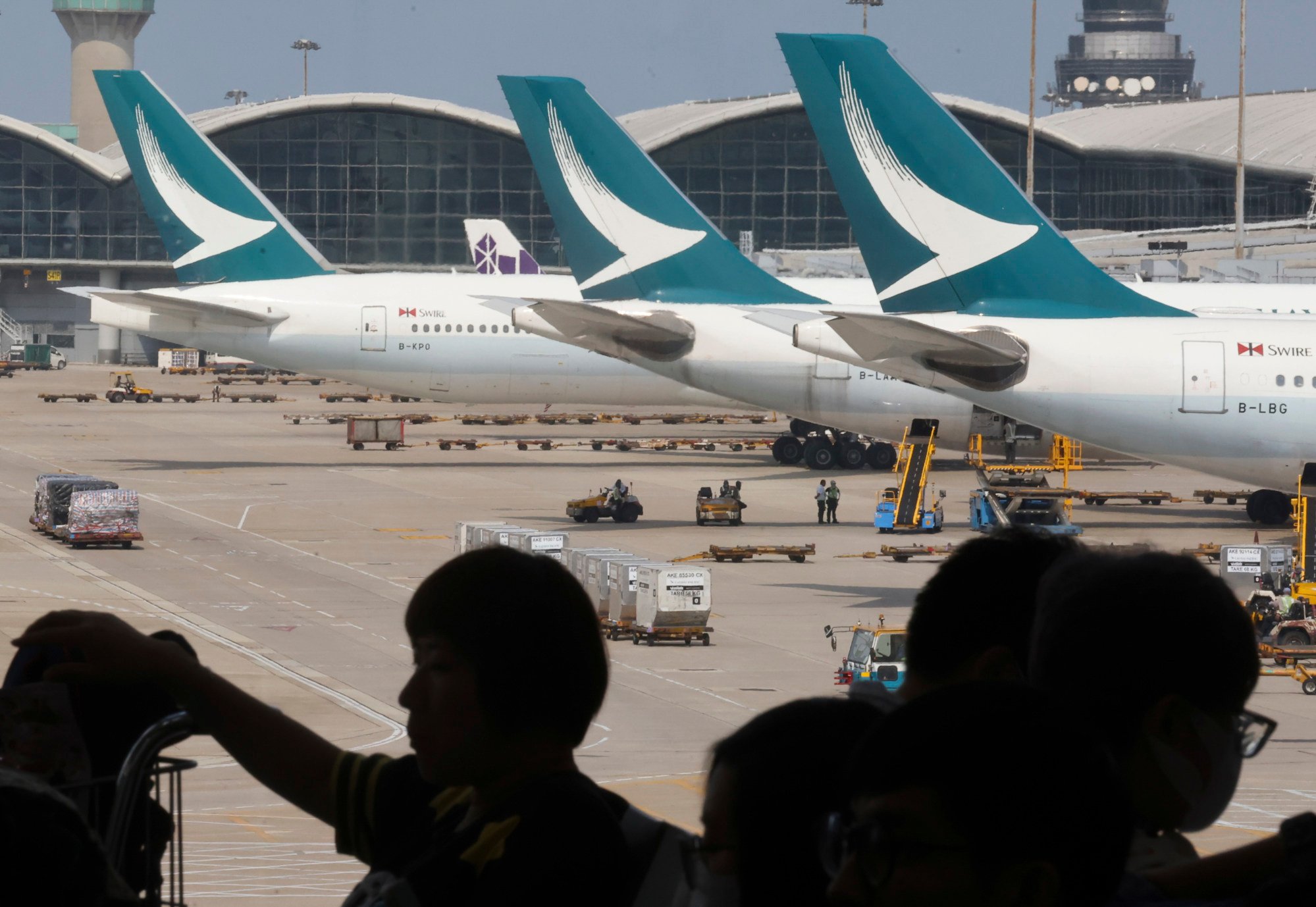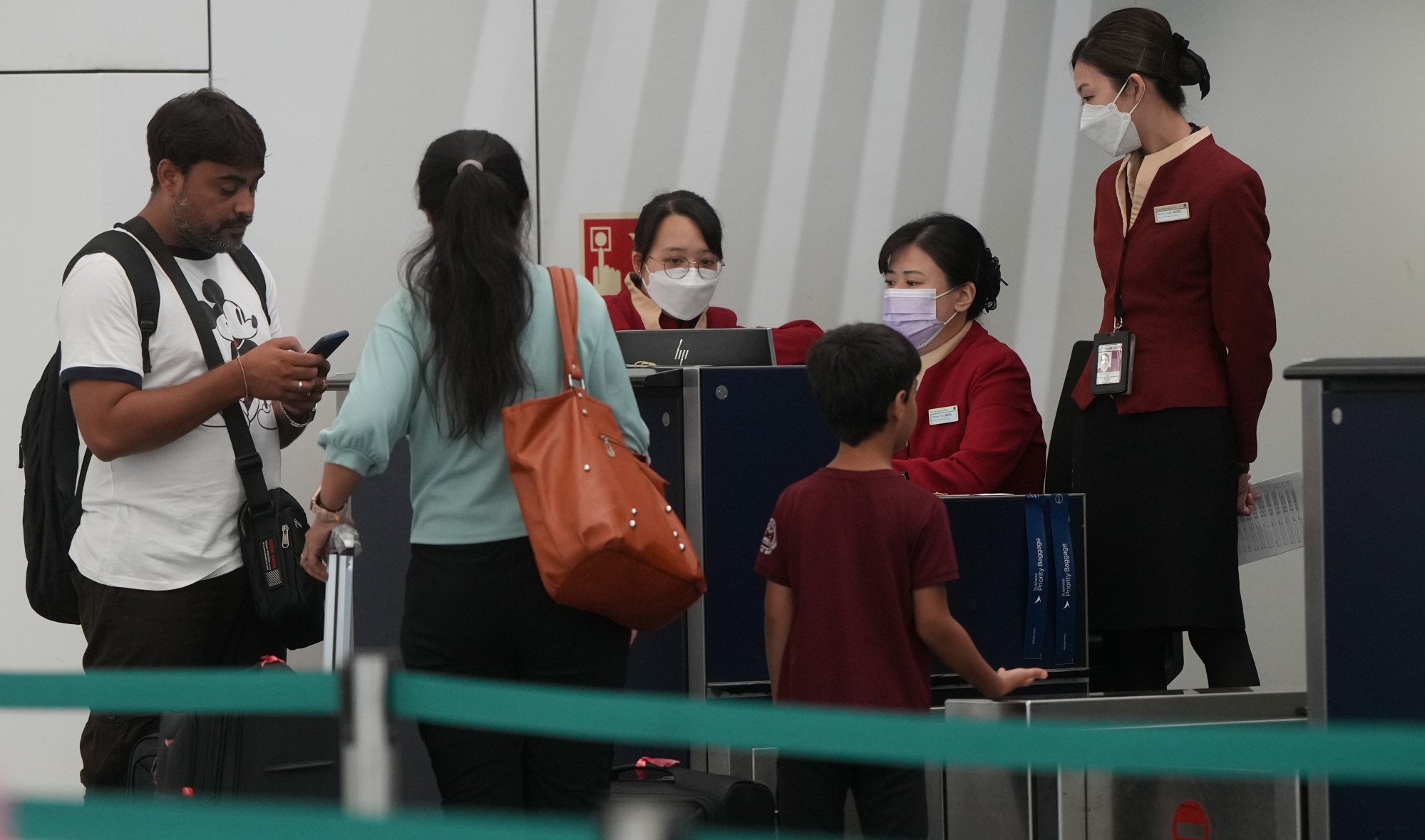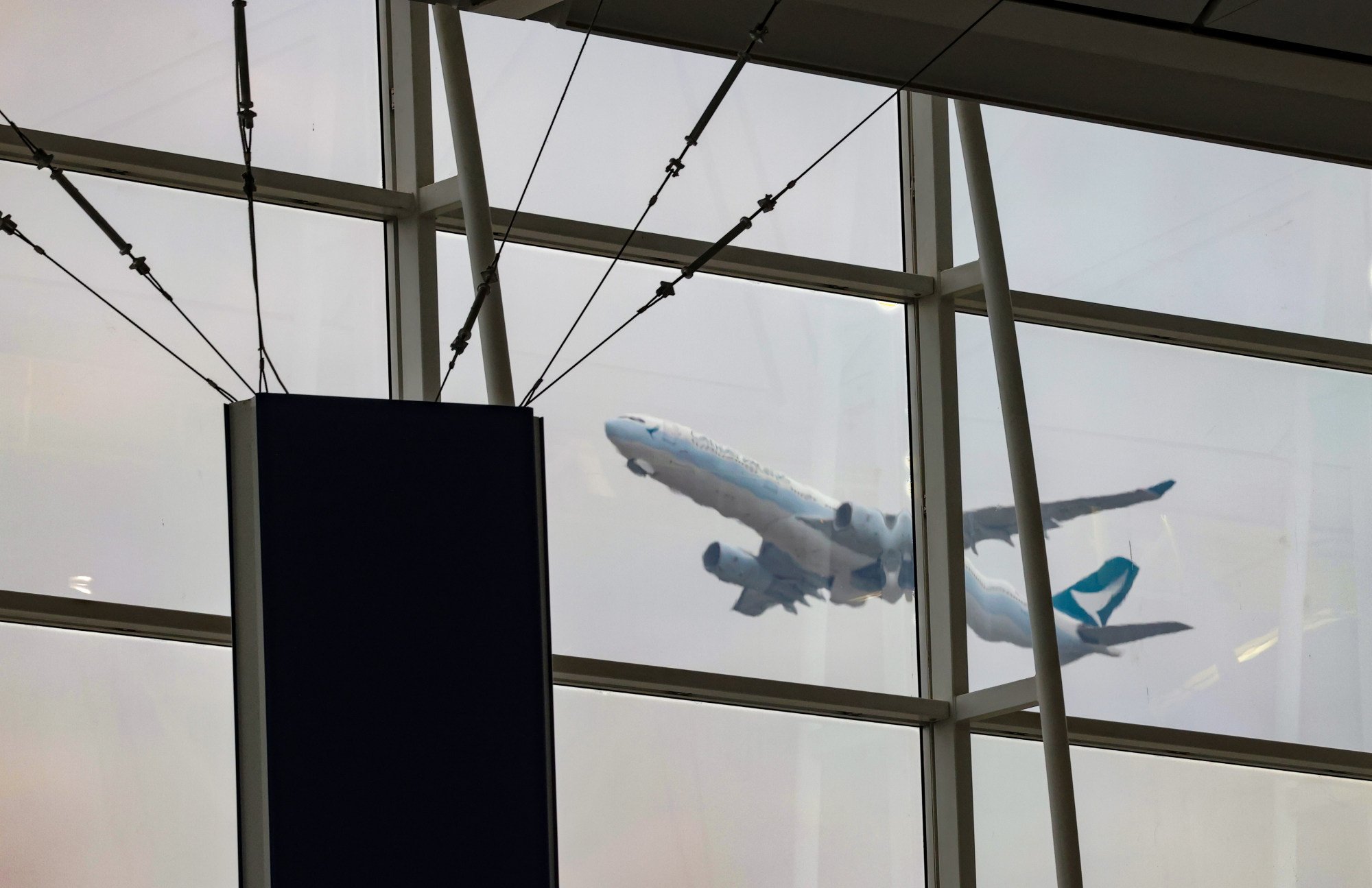
Cathay Pacific discrimination scandal: is it the tip of an iceberg of low morale, simmering Hong Kong-mainland tensions or just inexcusable bad behaviour?
- Analysts and employees of flag carrier ask whether Cathay can salvage reputation, save itself from mainlanders’ ire and rebuild standing in key customer base
- ‘The overall consensus from the crew community is that the company does not listen to their grievances despite voicing their concerns,’ insider says
Whether it was low staff morale, insufficient training or grievances about drastic pay cuts, it needed to resolve deep-seated issues or it could not be sure of causing yet another scandal, they said, pointing to a host of possible trigger points for the atrociously rude service at the heart of the crisis.

The advice came from independent analysts and employees of the flag carrier as it summarily sacked three cabin crew members a day earlier after complaints emerged of the staff insulting and discriminating against non-English speakers. The scandal has rapidly morphed into a political storm exposing the fissures between Hong Kong and mainland China, tensions that had long simmered below the surface, observers said.
The insult fiasco has now taken a new twist as mainlanders launched a vehement online attack on the airline, unleashing a barrage of criticism and verbal insults while others vowed to film Cathay crew and make public any further discriminatory behaviour.
Flight risk: unpacking pilot grievances at Hong Kong’s Cathay Pacific
Industry leaders said they feared that if the storm persisted, the recovery of Hong Kong’s tourism industry would be jeopardised.
As the airline struggled with a fast plummeting reputation, low staff morale because of drastic pay cuts and cumulative financial losses because of the Covid-19 pandemic, the debacle raised questions over whether Cathay could salvage its reputation, save itself from mainlanders’ ire and rebuild its standing in one of its most important customer bases – Chinese travellers flying from mainland routes to Hong Kong and destinations abroad.
According to a Mandarin-speaking passenger taking a flight from Chengdu in Sichuan province to Hong Kong on Sunday, three flight attendants made fun of customers’ English-language ability. In an online post with voice recording clips, the passenger quoted them as saying: “If you cannot say ‘blanket’, you cannot have it.”
After initially saying it was launching an investigation, Cathay was forced to act swiftly. CEO Ronald Lam Siu-por announced on Tuesday evening, less than 48 hours after reports of the incident emerged, the three crew members had been fired as he vowed to lead a cross-departmental task force to improve the company’s culture of “customers first”.
Hong Kong’s Cathay Pacific tries to defuse insult scandal as union blasts management
On Wednesday, he apologised in Mandarin to affected passengers and the public, the company’s fourth expression of regret over the incident in three days, soon after Chief Executive John Lee Ka-chiu expressed anger and disappointment over the episode, demanding answers as he declared it had damaged the city’s reputation.
As the city’s flag carrier, Cathay is a listed company but it is now deemed accountable to the government after it had to rely on government help. The company suffered a record net loss of HK$21.6 billion in 2020 after the pandemic grounded flights around the world, and it accepted a HK$39 billion government-backed restructuring plan in October that year, cutting thousands of jobs and axing its regional airline Cathay Dragon.
As part of the package to keep the struggling airline afloat, the government was issued HK$19.5 billion of dividend-paying preference shares repayable in three to five years, and granted it a HK$7.8 billion bridging loan.
As a cost-cutting measure, the airline introduced new and cheaper employment contracts for its flight and cabin crew.
‘Poor pay, lousy roster, low morale’
Opinions on the incident were sharply divided among the company rank-and-file, with some denouncing the flight attendants’ behaviour as unacceptable and others attributing the incident to staff’s grievances about pay cuts. The basic monthly salary for Cathay’s junior cabin crew members is now HK$9,100 (US$1,167), only a third the level before the pandemic hit, with wages boosted by allowances earned from long-haul flights.
Hong Kong’s Cathay Pacific has lost over half its senior pilots, union says
According to a source familiar with Cathay’s performance management, who declined to be named, the reaction from senior flight attendants was that the behaviour of the three fired crew members was unacceptable and against the ethics and professionalism required to care for passengers.
But some junior flight attendants felt the punishment was too harsh and complained that the incident was the result of crew members’ deep dissatisfaction with their rosters.
The insider said that he did not think the incident was related to training, as “all interpersonal skills are taught” to new hires from day one.

Rather, he said he believed the incident had to do with disgruntled individuals acting out of spite.
“The overall consensus from the crew community is that the company does not listen to their grievances despite voicing their concerns,” he said, adding complaints related to one less crew member on flights, a reduction in allowances during layovers and lower salaries, among others.
“Those who can afford to get another job just don’t care and treat their passengers shabbily,” he said.
Flight attendant Paul* said that according to the voice recording, it seemed like the cabin crew were “just discussing a scenario that had occurred earlier”.
Cathay Pacific passengers in Hong Kong split on cabin crew union’s industrial action
“Firing all three of them within hours, I doubt the company gave a thorough investigation or [gave them] a proper chance to explain the situation,” he said.
“The crew morale is already very low because of all the salary and benefits problems, and now this has made it even worse.”
Flight attendant Jane* echoed the sentiment. “It’s not like the crew member actually spoke to the passenger in that way. It’s absurd that they got fired by talking among themselves,” she said.
George*, a local cabin crew member who has worked for Cathay for more than a decade, said training about discrimination was limited.
“The initial training did mention we should avoid engaging in conversations with passengers on religion and race topics, but without elaboration,” he said.
The cabin crew member added he received on-the-job training once or twice a year, but the company’s instructions on avoiding discrimination put more emphasis on passengers with disabilities.
He added the airline was overreacting to the incident, despite the wrongdoings of the cabin crew members involved.
“This incident has blown up just because it involves mainland passengers that made it to the state media,” he said.
How Cathay Pacific is readying for take-off in the post-pandemic era
But flight attendant Carmen* said the sacked crew had attitude problems and should not have treated passengers the way they did.
“Some crew members do have discriminatory issues,” she said. “If the guests are Japanese who cannot speak good English, I bet they would not pick on their English and behave differently. As flight attendants, we should treat guests with hospitality and professionalism.”
She said mainland passengers were easy-going and less demanding than Western ones.
Flight attendant Michelle* told the Post that she sensed widespread fear among her colleagues across different ranks after news of the termination broke, noting that small talk between colleagues now involved mutual reminders to remain quiet when flying.
“No matter how unhappy we might be during the flight, we will now stomach it until we get off the plane,” Lam said.
Lam also recalled receiving a message from a senior flight attendant on Monday, when the incident went viral on social media, reminding colleagues to “uplift our professional image at all times” when in uniform and be aware of passengers when speaking in the galley.
The flight attendant recalled that attendants were taught to handle passenger complaints on the expectation they would complain to cabin crew immediately after an incident.
“It’s rarely about them recording the conversation quietly, posting it online and then making a complaint. For these situations, we haven’t had relevant training because we don’t expect them to do this,” Lam said.
Cathay Pacific to require cadet pilots to work with customers at Hong Kong’s airport
The Cathay Pacific Airways Flight Attendants’ Union on Wednesday urged the company to tackle the problem at its root.
“Cabin crew members have always respected and treated all passengers from different countries equally … Our crew members follow the company’s guidelines and communicate with passengers in English or other languages that have been assessed by the company,” it said.
“We are facing a shortage of both manpower and resources, a significant increase in workload and low salaries. The company ignores these problems, [and] as a result the morale of colleagues is extremely low, and complaints regarding cabin service have arisen.”
The union also said it noticed online appeals for passengers to provoke and record the behaviour of crew members, claiming it had caused huge pressure and extreme fear.
“The union publicly requests the company to provide clear guidance on how to protect frontline cabin crew members from unreasonable interference and successfully complete all flight services.”
An email sent by the union to its members seen by the Post also cited the company’s in-flight service delivery manual that if passengers film or photograph crew members without consent, crew should politely ask them to delete the content and should inform service cabin crew manager and captain if passengers refused to comply.
Deeper causes at play?
Lawmaker Perry Yiu Pak-leung, representing the tourism sector, said the airline should find out the cause of the fiasco and tackle the problems head on.
“Cathay should look into the fundamental cause of this debacle – whether it had something to do with the mentality of some individual crew, mounting grievances of the staff because of the drastic pay cut, or whether it was caused by the internal miscommunication with the aircrew,” he said.
“Cathay should find out the real cause to prevent similar incidents from happening again. If mainlanders have a bad impression about Hong Kong, it will be a blow to the recovery of our tourism industry.”
But Yiu emphasised that cabin crew should not vent their discontent over pay cuts in public, saying wage reductions should not be an excuse to treat passengers with disrespect.
Yiu advised the airline to enhance “customer first” training for flight attendants to ensure they upheld the spirit of hospitality, adding the company should prevent the issue from getting out of control.
Hong Kong’s Cathay Pacific posts loss of HK$6.5 billion for 2022
Senior lecturer Andrew Yuen Chi-lok of Chinese University’s Aviation Policy and Research Centre said Cathay would need time to rebuild its image in the mainland market and advised the airline to work harder to improve its corporate culture.
“In the service industry as an airline, all staff at different levels should have a customer-centric mindset. Any kind of discrimination is not acceptable. It should be the common consensus across all staff. In addition to the explicit regulations from top down, Cathay should consider how to rebuild its culture,” he said.
While the political furore was still brewing, economist Gary Ng Cheuk-yan from Natixis Corporate and Investment Bank, said that while the mainland market was indispensable to Cathay’s business, quality service would restore the airline’s reputation.
“If there aren’t any other more cost-effective options, customers will choose Cathay. It’s a competition problem,” Ng said.

The incident was not the first time Cathay has been in the cross hairs of Hong Kong-mainland tensions. During the 2019 anti-government protests, staff members were accused of supporting the demonstrators and even announcing their backing publicly. Then-CEO Rupert Hogg and chief customer and commercial officer Paul Loo stepped down to take responsibility for failing to rein in staff, after Merlin Swire, chairman of its main shareholder, Swire Pacific, was summoned to Beijing to make reparations.
Threatened with losing the right to fly to and over the mainland, Cathay took steps to appease the Chinese aviation regulator, including sacking staff who had taken part in the protests and declared its “strong support” for the Hong Kong government.
Legislator Gary Zhang Xinyu, who served as operations manager at the city’s transport giant MTR Corporation, said the government’s quick censure of Cathay over the latest incident had helped to soften the blow.
“It is better that the government officials’ take the initiative on incidents like this one. The earlier the better. The consequences would be severe if we allow the public sentiments to grow and escalate the incident to a political event,” Zhang said.
Singapore Airlines to pay staff 8 months’ bonus after record profit
Lau Siu-kai, a consultant at the semi-official Chinese Association of Hong Kong and Macau Studies think tank, said the local government’s tough response and mainland media’s intense outcry revealed the extent of accumulated tensions between Hongkongers and people over the border.
Over the past decade, this had surfaced as an issue, with Hongkongers insisting that mainlanders were badly behaved while the latter said they were being looked down upon unfairly.
“Mainlanders used to think of Hong Kong as superior to the mainland, hence, even if they might not be happy about the discrimination, they won’t push back, but it’s different now,” Lau said, pointing to how, as the country had prospered over the years, they expected to be treated fairly.
Lau said: “We should treat each other as equals, showing respect and empathy.”
Additional reporting by Laura Westbrook and Willa Wu
*Names changed at interviewees’ request



